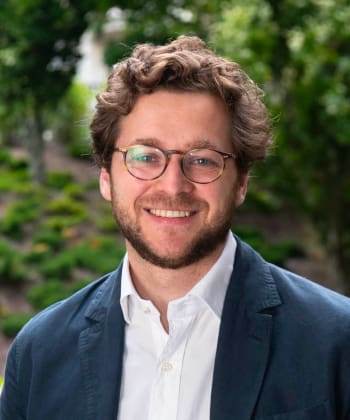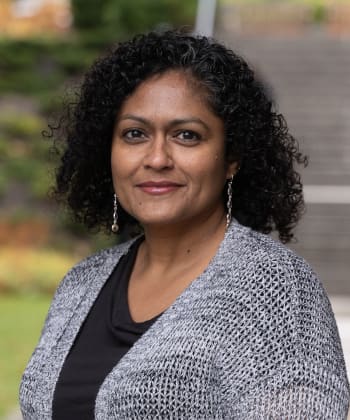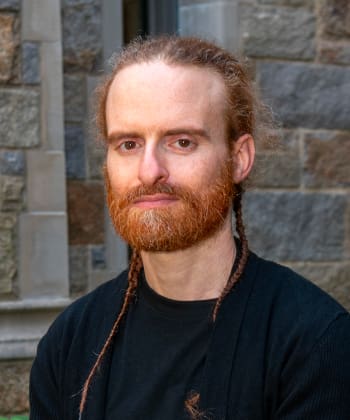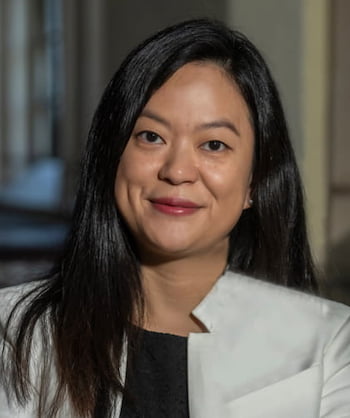

The Core Fellows Program at Boston College enables early career scholars from across the humanities, the natural sciences, the social sciences, and the arts to develop their research and teaching potential. Core Fellows contribute to the University Core Curriculum, the foundational, fifteen course program in the liberal arts that all Boston College students complete as part of their undergraduate education at a Jesuit, Catholic institution. Salary and research support are competitive. Initial appointments are for one year and are renewable upon favorable review for up to three years.
During one semester, each Core Fellow teaches hands-on, project-based labs for an interdisciplinary Complex Problem course team-taught by Boston College faculty. They work alongside experienced teaching mentors on topics such as climate change, race and gender, migration, and design and innovation. During another semester, each Core Fellow designs and teaches an Enduring Question course paired with a course taught by another Core Fellow. There may also be opportunities for Core Fellows to teach electives in their fields.
In the first year, Core Fellows attend an orientation and participate in course design workshops. Throughout the program, they also take part in sessions aimed at supporting them in their scholarly pursuits as well as in becoming outstanding instructors focused on the education of the whole person. Required specializations vary from year to year. Candidates should exhibit exceptional interdisciplinary research and teaching skills, display a capacity for originality and innovation, and be open to teaching undergraduate students holistically.

Kathryn Bruce is a Core Fellow/Visiting Assistant Professor in Environmental Humanities with a courtesy appointment in History. She received her Ph.D. in Modern History from the University of St. Andrews. Inspired by her time working as a research assistant at the Centre for Novel Agricultural Products at the University of York, Kathryn’s research centers on the social history of horticulture and plant science in the late nineteenth and early twentieth-century Anglophone world and provides insight into the social construction of disease threat and contingency of management practices. During the 2024-25 academic year, Kathryn was a research fellow at the Linda Hall Library, Kansas City, where she examined the response of communities of American fruit growers to food insecurity caused by climatic extremes. Throughout her Ph.D. program, Kathryn was the ‘History Catalyst’ for the Scottish Graduate School for the Arts and Humanities (SGSAH) Doctoral Researcher Committee, part of SGSAH’s governance structure. She remains on the committee in an alumna role. Kathryn holds an M.A. (Hons) in History and an M.Litt in Modern History, also from the University of St Andrews. She is a member of the Royal Historical Society, British Society for the History of Science, and the History of Science Society.

Evan Fernández is a Core Fellow/Visiting Assistant Professor in Justice and the Common Good with a courtesy appointment in History. Evan is a historian of modern Latin America with a focus on Chile, political economy, and migration. His first book project, The Promise of the Pacific: Chile, Japan, and Building Nations and Orders with Nitrate, examines transitions in the international orders of the Americas through the trans-Pacific commerce in Chilean nitrogen from the 1890s to the 1940s. Evan has published in the Journal of Global History and Diplomatic History. He received his Ph.D. in History from UC Berkeley in 2024, and was formerly a Postdoctoral Fellow at the Weatherhead Center for International Affairs at Harvard University and a Visiting Research Fellow at the Institute for Advanced Study at Waseda University in Tokyo, Japan.

Peter Giraudo is a Core Fellow/Visiting Assistant Professor in Justice and the Common Good with a courtesy appointment in Political Science. His book project, Political Trade Unionism: Industrial Cooperation and the Construction of the Class Struggle in Fin de siècle Europe, discloses a tradition of thought that saw socialist unions as ‘laboratories’ of a new cooperative culture and institutions that trained working-class representatives to faithfully represent worker interests in the class struggle. His scholarship has been published in Modern Intellectual History and History of European Ideas. Peter received a Ph.D. in Politics from Princeton University (2023). During the 2023-2024 academic year he was a postdoctoral fellow at the Justitia Center for Advanced Study at Goethe University Frankfurt. In the summer of 2025, he will be a visiting fellow at the Institute for Human Sciences in Vienna.

Gayathri Goel is a Core Fellow/Visiting Assistant Professor in Environmental Humanities. She received a Ph.D. in English from Tufts University. Her research focuses on representations of plants and places in global Anglophone literatures. Her book project, Past Plantations, Future Plots: Vegetal Regeneration and Revolt in the Caribbean Novel, uncovers “secret plots” to rebel against racialized capital and envision sovereignty by exposing the unsustainable logics of market growth. Gayathri is also co-editing a collection of scholarly essays, Entanglements: Regimes of Extraction and the Literary Imagination of Place, theorizing extractivism as a set of material and discursive practices that treats places and the various beings who inhabit these places as disposable. Gayathri is animated by interdisciplinary work that calls for collaboration with environmental scholars from various disciplines. She has been the recipient of numerous fellowships for research and teaching, including the prestigious year-long interdisciplinary research fellowship at Tufts Institute of the Environment (TIE).

Andrei Guadarrama is a Core Fellow/Visiting Assistant Professor in History and Social Science with a courtesy appointment in History. He earned a Ph.D. in History from Columbia University (2024). His scholarship focuses on the political economy of infrastructure and the social geography of modern cities. As an urban and public historian, he has experience with digital cartography, museum work, and community-based participatory research. Andrei is currently working on his first book manuscript, Circuits of Power: Economic Elites and the Politics of Development in Mexico City, 1870-1970. Based on original research, he curated the bilingual digital exhibit “Mobilities and the City” for Memorica Museum and Columbia University. His research has been funded by the International Dissertation Research Fellowship-Social Science Research Council (IDRF-SSRC), the Humanities New York Public History Grant, and several other fellowships. Andrei has taught courses on the history of the Americas and beyond. His teaching practice highlights the applications of historical thinking and interdisciplinary methods in ways that encourage students to value a diversity of experiences and thought in the past and present.

Siddhant Joshi is a Core Fellow/Visiting Assistant Professor in Engineering. He is a curious researcher and educator working at the nexus of engineering education and human development. Prior to joining Boston College, Sid earned his M.S. in Aeronautics and Astronautics from Purdue University as well as a B.E. in Mechanical Engineering from MIT World Peace University in Pune, India. In his research, Sid employs various qualitative and mixed methods approaches to investigate how engineers’ emotional experiences, systems thinking, and decision-making influence their problem framing and resolution in professional contexts. Drawing on the insights from this research, his work guides the development of empirically grounded frameworks, pedagogical tools, and interactive, scenario-based assessments that inform the cultivation and evaluation of students’ workplace readiness skills. His work seeks to actively translate these research products into classroom innovations that equip educators to develop ethical, reflective, and socially responsible engineers. Alongside research, Sid has designed and taught interdisciplinary courses at K-12, undergraduate, and graduate levels on topics such as humanities-informed engineering problem solving, design thinking, intercultural learning, engineering physics, and academic writing — all rooted in experiential and inquiry-based pedagogies. His teaching contributions led him to earn Purdue’s Outstanding Teaching Award, further driving his commitment to transforming engineering education. Ultimately, his work seeks to empower future engineering graduates with cognitive and emotive skills so that they are better prepared to address complex and sociotechnical problems that lie ahead of us.

Ethan Tupelo is a Core Fellow/Visiting Assistant Professor in Environmental Humanities with a courtesy appointment in Political Science. His work is at the interdisciplinary intersection of environmental politics, political theory, and social movements, and he has taught courses on utopian separatism, the State, radical political theory, comparative politics, the politics of waste and recycling, and ethnographic and qualitative research methodologies. Ethan received his Ph.D. in Political Science from the University of Massachusetts Amherst (2022), and was Visiting Assistant Professor of Critical Social Thought at Hampshire College from 2022-24. Ethan’s book manuscript, Debris of Progress: A Political Ethnography of Critical Infrastructure, is based on his five-year ethnographic study of Pedal People, a twenty-year-old worker cooperative that is one of the main waste haulers in Northampton, Massachusetts, but does all of its work by bicycle, hauling eight-foot long trailers filled with over 300 pounds of waste. Ethan shows how they challenge the destructiveness of waste infrastructure by eliminating the use of fossil fuels, providing worker ownership and control, and reclaiming the value of dirty work.

Hongyan Yang (杨鸿雁) is a Core Fellow/Visiting Assistant Professor in History and Social Science with a courtesy appointment in History. Trained as an urban planner, cultural geographer, and architectural historian, her interdisciplinary research considers the underexplored spatial and material dimensions of Asian American experiences. Intellectually invested in ethnic foodways and immigration history, she explores how Asian immigrants’ culinary traditions, cultural sensibilities, and complex identities invest new meanings to the cultural landscapes in the United States. She is currently working on several research projects, including her first book manuscript, Landscapes of Resistance: Chinese Placemaking across the Pacific, a museum project that documents the contributions of American architects of Chinese descent in collaboration with the Society of Architectural Historians and the Copper Hewitt, Smithsonian Design Museum, and an oral history project, “Places of Their Own,” funded by the National Endowment for the Humanities and Oral History Association. In addition to her research, she has developed community-centered teaching in Asian and Asian American architecture, as well as professional practices in historic preservation. She is the recipient of several awards, including the Sophie Coe Prize Honorable Mention, the Vernacular Architecture Forum Ambassadors Award, and the American Pacific Coast Geographers Committee Award for Excellence in Area Studies. Her recent work is featured in American Chinese Restaurants (2020) and Routledge Handbook of Food in Asia (2019). She holds a Ph.D. in Architecture in the Buildings-Landscapes-Cultures Program from the University of Wisconsin-Milwaukee.
Babson College
Barnard College
Boston College
Columbia University
Davidson College
Denison University
Duke University
Loyola University Chicago
Miami University, Ohio
U. S. Naval War College
The Ohio State University
State University of New York, Potsdam
University of California, Los Angeles
University of Dallas
Virginia Tech